THE EVANGELICAL REVIEW OF THEOLOGY & POLITICS
VOL. 8, 2020
ARTICLES
Jae Yang,
‘Pannenberg’s Trinitarian Theology and the Use of Theological Sources’
KEY WORDS
|| Sources || Pannennberg || Trinity || Scripture || Christ ||
ABSTRACT
 In this paper, I address the problem of determining which traditional sources (scripture, reason, tradition, experience) are authoritative in the construction of theology. The solution, I suggest, is not favouring one source against other, but including them all in a holistic and mutually affirming manner. To do so, I apply Wolfhart Pannenberg’s trinitarian theological method of part and whole, and particular and universal. In Pannenberg’s theology, Christ is both the norm of revelation and the agent of self-differentiation. Therefore, with Christ as the norm, I relativize theological sources as contextual revelations of Christ based on context. While I affirm Christ as the source of self-differentiation, I also affirm the universalizing ministry of the Holy Spirit. My hope is that theology will focus less attention on theological sources and determining which source is authoritative, and focus more on the God who reveals. If all of history itself (including all of the traditional Christian sources) is affirmed as a theological source, God’s omnipotence, eternality, and glory will be all the more glorified.
In this paper, I address the problem of determining which traditional sources (scripture, reason, tradition, experience) are authoritative in the construction of theology. The solution, I suggest, is not favouring one source against other, but including them all in a holistic and mutually affirming manner. To do so, I apply Wolfhart Pannenberg’s trinitarian theological method of part and whole, and particular and universal. In Pannenberg’s theology, Christ is both the norm of revelation and the agent of self-differentiation. Therefore, with Christ as the norm, I relativize theological sources as contextual revelations of Christ based on context. While I affirm Christ as the source of self-differentiation, I also affirm the universalizing ministry of the Holy Spirit. My hope is that theology will focus less attention on theological sources and determining which source is authoritative, and focus more on the God who reveals. If all of history itself (including all of the traditional Christian sources) is affirmed as a theological source, God’s omnipotence, eternality, and glory will be all the more glorified.
Uploaded/Published : March 8, 2020 | ERTP Vol 8, 2020, pages, A1-12
Matthew Wong,
‘A Survey of Evangelical Hermeneutical Approaches to Conservation’
KEY WORDS
|| Christian Environmentalism || Conservation || Biblical Interpretation ||
|| Evangelical attitudes || Eschatology || Premillennialism || Creation ||
ABSTRACT
 As environmental concerns have risen to prominence within many quarters of Evangelicalism, this article seeks to discover how scholarly evangelical attitudes towards conservation are informed by interpretation of Scripture. The literature of Western evangelical scholars is surveyed and chief hermeneutical approaches to conservation analysed and discussed. It is found that evangelical hermeneutical approaches are largely influenced by five principal factors, namely: (i) attempts to resolve the tension between the dominion and cultural mandates of Gen. 1:28 and 2:15 respectively (ii) understanding of creation’s ‘original state’ (iii) interpretation of the relationship between the Adamic and Edenic covenants (iv) eschatological outlook (v) hermeneutical literalism. It is concluded that many post– and amillennialist evangelical scholars – in stark contrast to dispensational premillennialists – are responding to past criticisms of Christianity’s perceived environmental indifference by embracing an eco-centric stewardship paradigm that views mankind’s chief ecologic function as guardian and protector of creation, not exploiter.
As environmental concerns have risen to prominence within many quarters of Evangelicalism, this article seeks to discover how scholarly evangelical attitudes towards conservation are informed by interpretation of Scripture. The literature of Western evangelical scholars is surveyed and chief hermeneutical approaches to conservation analysed and discussed. It is found that evangelical hermeneutical approaches are largely influenced by five principal factors, namely: (i) attempts to resolve the tension between the dominion and cultural mandates of Gen. 1:28 and 2:15 respectively (ii) understanding of creation’s ‘original state’ (iii) interpretation of the relationship between the Adamic and Edenic covenants (iv) eschatological outlook (v) hermeneutical literalism. It is concluded that many post– and amillennialist evangelical scholars – in stark contrast to dispensational premillennialists – are responding to past criticisms of Christianity’s perceived environmental indifference by embracing an eco-centric stewardship paradigm that views mankind’s chief ecologic function as guardian and protector of creation, not exploiter.
Uploaded/Published : May 11, 2020 | ERTP Vol 8, 2020, pages, A13-28
P.H. Brazier,
‘Saul, Epilepsy, & Conversion’
KEY WORDS
|| Saul/Paul || Epilepsy || Revelation-Conversion ||
|| Neurology || Trinity || Yeshua Ha Mashiach || Human Frailty ||
ABSTRACT
 The nature of Saul’s conversion event on the Damascus Road was cataclysmic and marked a profound change in the man and his beliefs, but also in the absolute and actual ontic nature of him as a human before God. In examining the conversion texts in Acts of the Apostles scholars have periodically raised the question, was Saul/Paul an epileptic? Initially we can examine the relevant biblical texts, we can then define, for the purposes of this essay, epilepsy and related neurological conditions. What has the academy decided on this question? Chief amongst our sources will be David Landsborough (medical doctor and bible scholar); also, what has a centuries old oral tradition decided? A fresh examination of the biblical text reveals details of other neurological conditions – Saul’s blindness and his healing, for example. While other examples in Acts refer obliquely to a disabling illness in Saul/Paul, that might appear to be epilepsy, historical diagnoses are fraught with difficulties. However, a possible, particular, diagnosis of Scintillating Scotoma does point to a divine sway on Saul in his transition to Paul: not simply a punishing encounter with El Shaddai (God Almighty), but a gruelling conversion to redemption in Jesus Christ: Yeshua Ha Mashiach.
The nature of Saul’s conversion event on the Damascus Road was cataclysmic and marked a profound change in the man and his beliefs, but also in the absolute and actual ontic nature of him as a human before God. In examining the conversion texts in Acts of the Apostles scholars have periodically raised the question, was Saul/Paul an epileptic? Initially we can examine the relevant biblical texts, we can then define, for the purposes of this essay, epilepsy and related neurological conditions. What has the academy decided on this question? Chief amongst our sources will be David Landsborough (medical doctor and bible scholar); also, what has a centuries old oral tradition decided? A fresh examination of the biblical text reveals details of other neurological conditions – Saul’s blindness and his healing, for example. While other examples in Acts refer obliquely to a disabling illness in Saul/Paul, that might appear to be epilepsy, historical diagnoses are fraught with difficulties. However, a possible, particular, diagnosis of Scintillating Scotoma does point to a divine sway on Saul in his transition to Paul: not simply a punishing encounter with El Shaddai (God Almighty), but a gruelling conversion to redemption in Jesus Christ: Yeshua Ha Mashiach.
Uploaded/Published : June 1, 2020 | ERTP Vol 8, 2020, pages, A29-46
Sherene Nicholas Khouri
‘The Classical Islamic Model of Revelation: A Critique’
KEY WORDS
|| Divine Revelation || Inspiration || Scripture ||
|| Infallibility || Qur’an || Islamic Classical Position ||
ABSTRACT
 The classical Islamic position of divine revelation considers the Qur’an inerrant because Allah dictated his speech, word for word, to prophet Mohammad through angel Jibril. Mohammad’s followers, in their turn, memorized the spoken Qur’an until the caliph ‘Uthman decided to compile the written Qur’an and send it to the other Islamic regions. The first part of the paper shall explain the classical position of divine revelation by following Noor Adin ‘Atir’s model of revelation. It shall also study the historical situation of the divine inspiration during and after the life of Mohammad. The second part of the paper shall focus on the weaknesses of the classical position of divine revelation and conclude that the classical position does not guarantee the inerrancy of the Qur’an.
The classical Islamic position of divine revelation considers the Qur’an inerrant because Allah dictated his speech, word for word, to prophet Mohammad through angel Jibril. Mohammad’s followers, in their turn, memorized the spoken Qur’an until the caliph ‘Uthman decided to compile the written Qur’an and send it to the other Islamic regions. The first part of the paper shall explain the classical position of divine revelation by following Noor Adin ‘Atir’s model of revelation. It shall also study the historical situation of the divine inspiration during and after the life of Mohammad. The second part of the paper shall focus on the weaknesses of the classical position of divine revelation and conclude that the classical position does not guarantee the inerrancy of the Qur’an.
Uploaded/Published : July 12, 2020 | ERTP Vol 8, 2020, pages, A47-58
Robert Schwarzwalder
‘C.S. Lewis as Christian Political Philosopher:
The Politics of Skepticism and Liberty’
KEY WORDS
|| C.S. Lewis || Politics || Government || Tory ||
||Conservative || Human Nature || Liberty ||
ABSTRACT
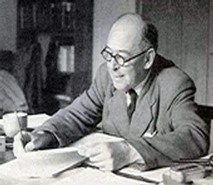 C.S. Lewis’s political views are sufficiently inferential that those seeking to captivate him for a given ideology or partisan allegiance tend to “proof text” their way to claiming him. A more sober and thorough understanding of Lewis’s public and private writings indicate a “mere conservatism” informed by skepticism of statist intervention and a belief that fallen man is also a noble being deserving of liberty and equal treatment by the law. In all his political musings, Lewis’s Christian faith animates his interest in public and political life and defines his beliefs about the end of history.
C.S. Lewis’s political views are sufficiently inferential that those seeking to captivate him for a given ideology or partisan allegiance tend to “proof text” their way to claiming him. A more sober and thorough understanding of Lewis’s public and private writings indicate a “mere conservatism” informed by skepticism of statist intervention and a belief that fallen man is also a noble being deserving of liberty and equal treatment by the law. In all his political musings, Lewis’s Christian faith animates his interest in public and political life and defines his beliefs about the end of history.
Uploaded/Published : September 1, 2020 | ERTP Vol 8, 2020, pages, A59-70
Geoffrey Butler
‘Social Service and the Imago Dei:
a Contemporary Analysis and Application
of an Ancient Christian Doctrine’
KEY WORDS
|| Image || Social || Human ||
|| Civil Rights || Bioethics || Poverty ||
ABSTRACT
 Despite all the diversity in the Christian tradition over exactly how the image of God ought to be defined, there has existed a broad consensus throughout the church’s history that human beings are indeed divine image-bearers, as per the clear teaching of Scripture in the opening chapter of Genesis and elsewhere. Given the impact this doctrine has exerted on past generations of Christians in their social and cultural engagement—such as the abolitionist and civil rights movements, for example—this paper makes the case that contemporary Christians, particularly in the increasingly post-Christian West, would be well served to recover this ancient doctrine as a catalyst for biblically informed cultural engagement in the modern era. It will argue that this doctrine is well positioned to inform such matters as bioethics and poverty, and that even in a rapidly secularizing culture, it is a doctrine that allows the Christian church to offer a unique perspective on social and cultural issues grounded in the inherent dignity of every human being.
Despite all the diversity in the Christian tradition over exactly how the image of God ought to be defined, there has existed a broad consensus throughout the church’s history that human beings are indeed divine image-bearers, as per the clear teaching of Scripture in the opening chapter of Genesis and elsewhere. Given the impact this doctrine has exerted on past generations of Christians in their social and cultural engagement—such as the abolitionist and civil rights movements, for example—this paper makes the case that contemporary Christians, particularly in the increasingly post-Christian West, would be well served to recover this ancient doctrine as a catalyst for biblically informed cultural engagement in the modern era. It will argue that this doctrine is well positioned to inform such matters as bioethics and poverty, and that even in a rapidly secularizing culture, it is a doctrine that allows the Christian church to offer a unique perspective on social and cultural issues grounded in the inherent dignity of every human being.
Uploaded/Published : September 13, 2020 | ERTP Vol 8, 2020, pages, A71-84
Jacob S. Bullock
‘Ἐν Χριστῷ Out of Context:
The Zen-ification of the Son of God’
KEY WORDS
|| Zen-Christian || Theology of Religions ||
|| Jesus || Biblical Theology || Gospel || Buddhism ||
ABSTRACT
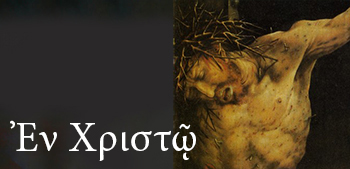 Zen-Christianity is a plural-istic theological movement that is gaining greater acceptance in the global evangelical community. Members of this movement claim to have achieved a theological bilingualism in which both distinct theological/philosophical systems are held in concert without conflict or distortion of one by the other. This article argues that far from achieving theological harmony, Zen-Christian theology severely distorts numerous tenants of orthodox Christian faith including the person and work of Jesus Christ. In demonstration of this, this article examines the Zen-Christian theology of Jesus as presented by Ruben Habito, a prominent theologian of the Zen-Christian movement. From an exegetical and biblical-theological perspective this article demonstrates that in order to fit Jesus into his Zen-Christian theological program, Habito must divorce Jesus from his theological, linguistic, and historical context. This article concludes that because it distorts the deity, teachings, and nature of Jesus Christ, Zen-Christianity, as presented by Habito, should be completely rejected by the evangelical community.
Zen-Christianity is a plural-istic theological movement that is gaining greater acceptance in the global evangelical community. Members of this movement claim to have achieved a theological bilingualism in which both distinct theological/philosophical systems are held in concert without conflict or distortion of one by the other. This article argues that far from achieving theological harmony, Zen-Christian theology severely distorts numerous tenants of orthodox Christian faith including the person and work of Jesus Christ. In demonstration of this, this article examines the Zen-Christian theology of Jesus as presented by Ruben Habito, a prominent theologian of the Zen-Christian movement. From an exegetical and biblical-theological perspective this article demonstrates that in order to fit Jesus into his Zen-Christian theological program, Habito must divorce Jesus from his theological, linguistic, and historical context. This article concludes that because it distorts the deity, teachings, and nature of Jesus Christ, Zen-Christianity, as presented by Habito, should be completely rejected by the evangelical community.
Uploaded/Published : September 18, 2020 | ERTP Vol 8, 2020, pages, A85-96
Eugen Spierer
‘The Dialectic between Creation and Crucifixion’
KEY WORDS
|| Creation and Crucifixion || Dialectical Theology || Theology of the Cross ||
|| Attributes of God || Martin Luther || Karl Barth ||
ABSTRACT
 Previous conceptions of the attributes of God describe Him as omnipotent, omniscient, and omnipresent. These conceptions are based upon the human traits of ability, knowledge, and presence, extended ad infinitum. They are thus unacceptable by Luther’s theology of the cross. Drawing upon the Psalmist’s idea of creation being the handiwork of God and Luther’s assertion that God reveals Himself at the cross of Christ alone, I suggest a different attribute of God, one based upon the chasm between the gloriousness of creation and the lowliness of the crucifixion, utilizing the two as extremes of a dialectic between which God is to be known.
Previous conceptions of the attributes of God describe Him as omnipotent, omniscient, and omnipresent. These conceptions are based upon the human traits of ability, knowledge, and presence, extended ad infinitum. They are thus unacceptable by Luther’s theology of the cross. Drawing upon the Psalmist’s idea of creation being the handiwork of God and Luther’s assertion that God reveals Himself at the cross of Christ alone, I suggest a different attribute of God, one based upon the chasm between the gloriousness of creation and the lowliness of the crucifixion, utilizing the two as extremes of a dialectic between which God is to be known.
Uploaded/Published : September 21, 2020 | ERTP Vol 8, 2020, pages, A97-106
 ESSAY SERIES
ESSAY SERIES
“Homosexuality:
The Case For & Against”
A Series of Essays
Exploring the Question
of Homosexuality
Stephen M. Vantassel || David Martin || Brian Huffling & Thomas J. Gentry
REVIEW ARTICLES
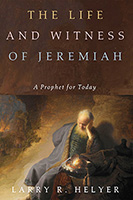 Review Article
Review Article
Jeremiah: An Ancient Voice with a Relevant Message
Larry R. Helyer
The Life and Witness of Jeremiah. A Prophet for Today.
Eugene, OR: Cascade Books, 2019. pp. 126. $20.00.
ISBN 978-1-5326-1693-8.
KEY WORDS
|| Christian Nationalism || God’s Providence || Prophecy || Kingdom || Israel || America ||
Reviewed by Esteban Miranda
Uploaded/Published : June 29, 2020 | ERTP Vol 8, 2020, pages, RA1-6.
Review Article
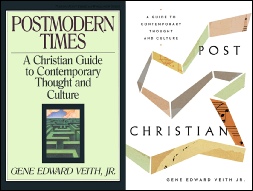 From Postmodern to Post-Christian: Gene Veith’s Cultural-Ideological Analysis
From Postmodern to Post-Christian: Gene Veith’s Cultural-Ideological Analysis
Gene Edward Veith Jr., Postmodern Times: A Christian Guide to Contemporary Thought and Culture (Series edited by Marvin Olasky). Wheaton, IL: Crossway, 1994.
pp 256. ISBN-10 0-89107-768-5
Gene Edward Veith Jr., Post-Christian: A Guide to Contemporary Thought and Culture. Wheaton,IL: Crossway, 2020. pp.320. ISBN-10 1-4335-6578-1
KEY WORDS
|| Postmodern || Postsecularism || Post-Christian || Apologetics || Worldview || Culture ||
Reviewed by William B. Bowes
Uploaded/Published : August 13, 2020 | ERTP Vol 8, 2020, pages, RA7-16.
BOOK REVIEWS.
Review: 2020-01
Craig A. Carter,
Interpreting Scripture with the Great Tradition:
Recovering the Genius of Premodern Exegesis.
Grand Rapids, MI: BakerAcademic, 2018. 279 pages
Reviewed by Emily Buck
Uploaded/Published : January 1, 2020 | ERTP Vol 8, 2020,
pages, BR1-2.
Review: 2020-02
William J. Webb and Gordon K. Oeste,
Bloody, Brutal, and Barbaric?
Wrestling with Troubling War Texts .
Downers Grove, IL: InterVarsity Press, 2019. 397 pages
Reviewed by Stephen M. Vantassel
Uploaded/Published : January 1, 2020 | ERTP Vol 8, 2020,
pages, BR3-6.
Review: 2020-03
Bill Seney,
The Blind Faith Hypothesis:
Intellectual Challenge to Naturalism, Theism,
Pantheism, Polytheism, and Post-Modernism.
Author Published, 2019
Reviewed by Kenneth R. Marple
Uploaded/Published : January 1, 2020 | ERTP Vol 8, 2020,
pages, BR7-10.
Review: 2020-04
Scot McKnight,
Pastor Paul: Nurturing a Culture of Christoformity
in the Church.
Grand Rapids, MI: Brazos Press, 2019
Reviewed by Aaron Perry
Uploaded/Published : January 14, 2020 | ERTP Vol 8, 2020,
pages, BR11-14.
Review: 2020-05
Luke Jeffrey Janssen,
Soul-Searching: The Evolution of Judeo-Christian Thinking
on the Soul and the Afterlife.
Eugene, Or: Wipf & Stock, 2019
Reviewed by Viktor Toth
Uploaded/Published : January 16, 2020 | ERTP Vol 8, 2020,
pages, BR15-16.
Review: 2020-06
Giles J. Harp,
Protestants and American Conservativism: A Short History.
New York, NY: Oxford University Press, 2019.
Reviewed by Brendon Michael Norton.
Uploaded/Published : January 23, 2020 | ERTP Vol 8, 2020,
pages, BR17-20.
Review: 2020-07
Elise Daniels (ed.),
Called to Freedom:
Why You Can Be Christian And Libertarian.
Eugene, OR: Wipf & Stock, 2017.
Reviewed by Jonathan Ashbach
Uploaded/Published : May 3, 2020 | ERTP Vol 8, 2020,
pages, BR21-24.
BOOK REVIEWS.
Review: 2020-08
Jonathan Wilson-Hartgrove
Revolution of Values:
Reclaiming Public Faith for the Common Good.
Downers Grove, IL: InterVarsity Press, 2019..
Reviewed by Rev. Timothy R. Scheuers
Uploaded/Published : May 28, 2020 | ERTP Vol 8, 2020,
pages, BR25-28.
Review: 2020-09
John S. Dickerson,
Jesus Skeptic: A Journalist Explores
the Credibility and Impact of Christianity.
Ada, MI: Baker Books, 2019. 294 pp.
Reviewed by Kenneth R. Marple
Uploaded/Published : June 9, 2020 | ERTP Vol 8, 2020,
pages, BR29-30.
Review: 2020-10
Darrell L. Bock,
Ephesians (Tyndale New Testament Commentary).
Downers Grove, Il: IVP Academic, 2019. pp. 213.
Reviewed by Anthony Royle
Uploaded/Published : June 27, 2020 | ERTP Vol 8, 2020,
pages, BR31-32.
Review: 2020-11
William Cully Allen,
Jesus Among Giants:
Religious Biographies in Comparative Context.
New York, NY: Peter Lang, 2019. ix-142 with index
Reviewed by Stephen M. Vantassel
Uploaded/Published : July 8, 2020 | ERTP Vol 8, 2020,
pages, BR33-34.
Review: 2020-12
John S. Kloppenborg,
Christ’s Associations:
Connecting and Belonging in the Ancient City.
New Haven, CT: Yale University Press, 2019.
Reviewed by Brendon Michael Norton
Uploaded/Published : August 14, 2020 | ERTP Vol 8, 2020,
pages, BR35-38.
Review: 2020-13
Gavin R. Ortlund,
Retrieving Augustine’s Doctrine of Creation:
Ancient Wisdom for Current Controversy.
Downers Grove, IL: InterVarsity Press, 2020.
ISBN 978-0-8308-5324-3. ix +249 pgs.
Reviewed by Stephen M. Vantassel
Uploaded/Published : August 17, 2020 | ERTP Vol 8, 2020,
pages, BR39-42.
Review: 2020-14
Clayton King,
Reborn: How Encountering Jesus
Changes Everything.
Baker Books, Grand Rapids, MI, 2020.
pp. 211. ISBN: 978-080101960.
Reviewed by Matthew Wong
Uploaded/Published : October 26, 2020 | ERTP Vol 8, 2020,
pages, BR43-46.





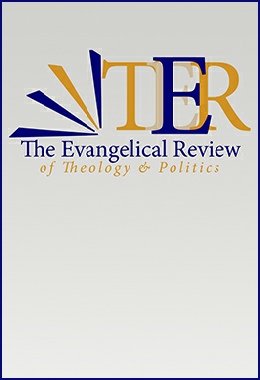



 In this paper, I address the problem of determining which traditional sources (scripture, reason, tradition, experience) are authoritative in the construction of theology. The solution, I suggest, is not favouring one source against other, but including them all in a holistic and mutually affirming manner. To do so, I apply Wolfhart Pannenberg’s trinitarian theological method of part and whole, and particular and universal. In Pannenberg’s theology, Christ is both the norm of revelation and the agent of self-differentiation. Therefore, with Christ as the norm, I relativize theological sources as contextual revelations of Christ based on context. While I affirm Christ as the source of self-differentiation, I also affirm the universalizing ministry of the Holy Spirit. My hope is that theology will focus less attention on theological sources and determining which source is authoritative, and focus more on the God who reveals. If all of history itself (including all of the traditional Christian sources) is affirmed as a theological source, God’s omnipotence, eternality, and glory will be all the more glorified.
In this paper, I address the problem of determining which traditional sources (scripture, reason, tradition, experience) are authoritative in the construction of theology. The solution, I suggest, is not favouring one source against other, but including them all in a holistic and mutually affirming manner. To do so, I apply Wolfhart Pannenberg’s trinitarian theological method of part and whole, and particular and universal. In Pannenberg’s theology, Christ is both the norm of revelation and the agent of self-differentiation. Therefore, with Christ as the norm, I relativize theological sources as contextual revelations of Christ based on context. While I affirm Christ as the source of self-differentiation, I also affirm the universalizing ministry of the Holy Spirit. My hope is that theology will focus less attention on theological sources and determining which source is authoritative, and focus more on the God who reveals. If all of history itself (including all of the traditional Christian sources) is affirmed as a theological source, God’s omnipotence, eternality, and glory will be all the more glorified. As environmental concerns have risen to prominence within many quarters of Evangelicalism, this article seeks to discover how scholarly evangelical attitudes towards conservation are informed by interpretation of Scripture. The literature of Western evangelical scholars is surveyed and chief hermeneutical approaches to conservation analysed and discussed. It is found that evangelical hermeneutical approaches are largely influenced by five principal factors, namely: (i) attempts to resolve the tension between the dominion and cultural mandates of Gen. 1:28 and 2:15 respectively (ii) understanding of creation’s ‘original state’ (iii) interpretation of the relationship between the Adamic and Edenic covenants (iv) eschatological outlook (v) hermeneutical literalism. It is concluded that many post– and amillennialist evangelical scholars – in stark contrast to dispensational premillennialists – are responding to past criticisms of Christianity’s perceived environmental indifference by embracing an eco-centric stewardship paradigm that views mankind’s chief ecologic function as guardian and protector of creation, not exploiter.
As environmental concerns have risen to prominence within many quarters of Evangelicalism, this article seeks to discover how scholarly evangelical attitudes towards conservation are informed by interpretation of Scripture. The literature of Western evangelical scholars is surveyed and chief hermeneutical approaches to conservation analysed and discussed. It is found that evangelical hermeneutical approaches are largely influenced by five principal factors, namely: (i) attempts to resolve the tension between the dominion and cultural mandates of Gen. 1:28 and 2:15 respectively (ii) understanding of creation’s ‘original state’ (iii) interpretation of the relationship between the Adamic and Edenic covenants (iv) eschatological outlook (v) hermeneutical literalism. It is concluded that many post– and amillennialist evangelical scholars – in stark contrast to dispensational premillennialists – are responding to past criticisms of Christianity’s perceived environmental indifference by embracing an eco-centric stewardship paradigm that views mankind’s chief ecologic function as guardian and protector of creation, not exploiter. The nature of Saul’s conversion event on the Damascus Road was cataclysmic and marked a profound change in the man and his beliefs, but also in the absolute and actual ontic nature of him as a human before God. In examining the conversion texts in Acts of the Apostles scholars have periodically raised the question, was Saul/Paul an
The nature of Saul’s conversion event on the Damascus Road was cataclysmic and marked a profound change in the man and his beliefs, but also in the absolute and actual ontic nature of him as a human before God. In examining the conversion texts in Acts of the Apostles scholars have periodically raised the question, was Saul/Paul an  The classical Islamic position of divine revelation considers the Qur’an inerrant because Allah dictated his speech, word for word, to prophet Mohammad through angel Jibril. Mohammad’s followers, in their turn, memorized the spoken Qur’an until the caliph ‘Uthman decided to compile the written Qur’an and send it to the other Islamic regions. The first part of the paper shall explain the classical position of divine revelation by following Noor Adin ‘Atir’s model of revelation. It shall also study the historical situation of the divine inspiration during and after the life of Mohammad. The second part of the paper shall focus on the weaknesses of the classical position of divine revelation and conclude that the classical position does not guarantee the inerrancy of the Qur’an.
The classical Islamic position of divine revelation considers the Qur’an inerrant because Allah dictated his speech, word for word, to prophet Mohammad through angel Jibril. Mohammad’s followers, in their turn, memorized the spoken Qur’an until the caliph ‘Uthman decided to compile the written Qur’an and send it to the other Islamic regions. The first part of the paper shall explain the classical position of divine revelation by following Noor Adin ‘Atir’s model of revelation. It shall also study the historical situation of the divine inspiration during and after the life of Mohammad. The second part of the paper shall focus on the weaknesses of the classical position of divine revelation and conclude that the classical position does not guarantee the inerrancy of the Qur’an. C.S. Lewis’s political views are sufficiently inferential that those seeking to captivate him for a given ideology or partisan allegiance tend to “proof text” their way to claiming him. A more sober and thorough understanding of Lewis’s public and private writings indicate a “mere conservatism” informed by skepticism of statist intervention and a belief that fallen man is also a noble being deserving of liberty and equal treatment by the law. In all his political musings, Lewis’s Christian faith animates his interest in public and political life and defines his beliefs about the end of history.
C.S. Lewis’s political views are sufficiently inferential that those seeking to captivate him for a given ideology or partisan allegiance tend to “proof text” their way to claiming him. A more sober and thorough understanding of Lewis’s public and private writings indicate a “mere conservatism” informed by skepticism of statist intervention and a belief that fallen man is also a noble being deserving of liberty and equal treatment by the law. In all his political musings, Lewis’s Christian faith animates his interest in public and political life and defines his beliefs about the end of history. Despite all the diversity in the Christian tradition over exactly how the image of God ought to be defined, there has existed a broad consensus throughout the church’s history that human beings are indeed divine image-bearers, as per the clear teaching of Scripture in the opening chapter of Genesis and elsewhere. Given the impact this doctrine has exerted on past generations of Christians in their social and cultural engagement—such as the abolitionist and civil rights movements, for example—this paper makes the case that contemporary Christians, particularly in the increasingly post-Christian West, would be well served to recover this ancient doctrine as a catalyst for biblically informed cultural engagement in the modern era. It will argue that this doctrine is well positioned to inform such matters as bioethics and poverty, and that even in a rapidly secularizing culture, it is a doctrine that allows the Christian church to offer a unique perspective on social and cultural issues grounded in the inherent dignity of every human being.
Despite all the diversity in the Christian tradition over exactly how the image of God ought to be defined, there has existed a broad consensus throughout the church’s history that human beings are indeed divine image-bearers, as per the clear teaching of Scripture in the opening chapter of Genesis and elsewhere. Given the impact this doctrine has exerted on past generations of Christians in their social and cultural engagement—such as the abolitionist and civil rights movements, for example—this paper makes the case that contemporary Christians, particularly in the increasingly post-Christian West, would be well served to recover this ancient doctrine as a catalyst for biblically informed cultural engagement in the modern era. It will argue that this doctrine is well positioned to inform such matters as bioethics and poverty, and that even in a rapidly secularizing culture, it is a doctrine that allows the Christian church to offer a unique perspective on social and cultural issues grounded in the inherent dignity of every human being. Zen-Christianity is a plural-istic theological movement that is gaining greater acceptance in the global evangelical community. Members of this movement claim to have achieved a theological bilingualism in which both distinct theological/philosophical systems are held in concert without conflict or distortion of one by the other. This article argues that far from achieving theological harmony, Zen-Christian theology severely distorts numerous tenants of orthodox Christian faith including the person and work of Jesus Christ. In demonstration of this, this article examines the Zen-Christian theology of Jesus as presented by Ruben Habito, a prominent theologian of the Zen-Christian movement. From an exegetical and biblical-theological perspective this article demonstrates that in order to fit Jesus into his Zen-Christian theological program, Habito must divorce Jesus from his theological, linguistic, and historical context. This article concludes that because it distorts the deity, teachings, and nature of Jesus Christ, Zen-Christianity, as presented by Habito, should be completely rejected by the evangelical community.
Zen-Christianity is a plural-istic theological movement that is gaining greater acceptance in the global evangelical community. Members of this movement claim to have achieved a theological bilingualism in which both distinct theological/philosophical systems are held in concert without conflict or distortion of one by the other. This article argues that far from achieving theological harmony, Zen-Christian theology severely distorts numerous tenants of orthodox Christian faith including the person and work of Jesus Christ. In demonstration of this, this article examines the Zen-Christian theology of Jesus as presented by Ruben Habito, a prominent theologian of the Zen-Christian movement. From an exegetical and biblical-theological perspective this article demonstrates that in order to fit Jesus into his Zen-Christian theological program, Habito must divorce Jesus from his theological, linguistic, and historical context. This article concludes that because it distorts the deity, teachings, and nature of Jesus Christ, Zen-Christianity, as presented by Habito, should be completely rejected by the evangelical community. Previous conceptions of the attributes of God describe Him as omnipotent, omniscient, and omnipresent. These conceptions are based upon the human traits of ability, knowledge, and presence, extended
Previous conceptions of the attributes of God describe Him as omnipotent, omniscient, and omnipresent. These conceptions are based upon the human traits of ability, knowledge, and presence, extended  ESSAY SERIES
ESSAY SERIES Review Article
Review Article From Postmodern to Post-Christian: Gene Veith’s Cultural-Ideological Analysis
From Postmodern to Post-Christian: Gene Veith’s Cultural-Ideological Analysis